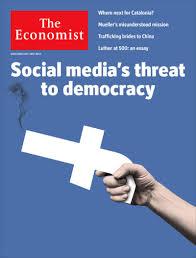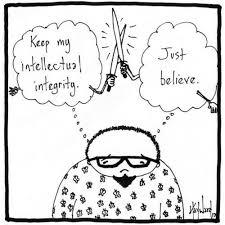
We evolved as an extraordinarily social species, with group cooperation a key adaptation. Of course every animal looks out for itself, to get its genes into the next generation. But humans balanced that selfishness against cooperativeness so the whole group could thrive and replicate. That required being able to tell who was really cooperative, and who was faking and should be shunned and punished. So we evolved instinctive lie-detectors.
Thus too cynicism is an evolved psychology. We certainly see a lot of that in the realm of public affairs, with many people skeptical toward the political class, thinking they’re all liars, corrupt and incompetent. That’s been a big driver of political populism all across the world. Making voters receptive to would-be strongmen saying, “Only I can fix it!”

Wait, what? Why doesn’t the latter incur the same cynicism and skepticism? This has been vexing me for half a decade. Why do so many voters’ intuitive lie detectors fail so spectacularly when it comes to a con man like Trump? Can’t they see they’re being manipulated?
Well, that is what con men do. Often successfully, because our inner lie detectors are fallible. Nobody is immune; I’ve been fooled myself sometimes in life. However, there are some basic precepts one can apply.

In many cases you can’t directly verify information; but you can consider the source. Whether there’s good reason to trust it. That’s true of responsible, conscientious mainstream news media, like PBS, NPR, The Economist, The New York Times. As opposed to fake ones like Fox or Breitbart, or what a Facebook friend saw somewhere on the internet. One can also normally trust mainstream science (with understanding of how science actually works), as opposed to hucksters with different agendas (such as religion).
Which brings up the second precept: to consider the motivation — why are they pushing the story they’re pushing? Is it to inform you — or manipulate you?
And thirdly, one must develop a good accurate mental model of the world’s reality and how it works, grounded in factual knowledge. Then assess how any assertion fits with that reality. A basic plausibility test.

Too many people get all this wrong. They’re cynical about responsible news sources like those I mentioned while uncritically swallowing crap from dodgy ones (even the likes of Alex Jones). They similarly discount mainstream science while taking crackpots seriously. And their mental models of reality are like Hieronymus Bosch phantasmagorias.

So Trump says mail voting is a giant fraud disaster. And his supporters nod their heads (“ditto-heads” in apt Limbaugh-speak), fall right in line, and parrot the trope. Not even envisioning the possibility it isn’t true.
But consider the source. With a huge record of lying. And the motivation: obvious self-serving reasons to create this lie. Knowing most mail ballots will go against him, and only by getting rid of them can he win. (He’s actually said so.)
Consider too the plausibility. Look at actual facts. Use your head. Were mail voting really so prone to fraud, wouldn’t candidates have massively exploited that before, with major scandals? There have been practically none. Instead, mail voting has been widely used for years, with only insignificant glitches. (Nothing is ever perfect.)
Thus Trump’s claims flunk all three tests. He’s so obviously manipulating his fans. It will be more dangerous for the country in November when they’ll believe his election defeat is some sort of illegitimate coup. The syndrome can even be fatal. A gal at the Democratic convention spoke of her father’s covid death, saying his “pre-existing condition” was believing Trump. (Even after his own infection, he’s resumed saying the virus is no big deal. As if we can all get presidential level medical care.)
Trumpsuckers’ falling for his manipulation might seem bizarre. Where is all the cynicism they deploy elsewhere? Can’t they see Trump’s own blatant cynicism? There are actually many explanatory factors. One is Trump playing upon their resentments and anxieties, economic but especially racial and cultural, like no other politician. He certainly exploits their hatreds — of elites and seemingly pushy minorities, and their left wing Democratic avatars — which Trump revvs up to fever pitch. Trumpsters vote less for him than against their bêtes noires.

Perhaps too, after long bathing in corrosive cynicism, many actually thirst for an antidote, for something to believe in. Religion is of course one way to get that. Trump seems to be another. Indeed, there are many comorbidities. The one-third or so of Americans who are strongly religious and the third or so diehard Trumpers are mostly the same people. Religion undermines critical thinking and accustoms receptivity to tropes that flout reality. Both religion and Trumpism share cult-like characteristics. It’s the same willingness to believe, the hunger to believe. Belief itself being a kind of mood-altering drug.
But I find truth and reality better.
